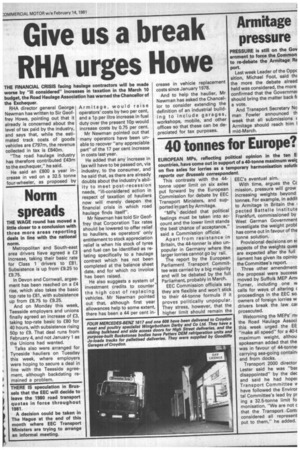Give us a break RHA urges Howe
Page 5

If you've noticed an error in this article please click here to report it so we can fix it.
THE FINANCIAL CRISIS facing haulage contractors will be made worse by "ill considered" increases in taxation in the March 10 budget, the Road Haulage Association has warned the Chancellor of the Exchequer.
RHA director general George Newman has written to Sir Geoffrey Howe, pointing out that it already is concerned about the level of tax paid by the industry, and says that, while the estimated track costs of goods vehicles are £797m, the revenue collected in tax is £840m.
"The road haulage industry has therefore contributed £43m to the exchequer," he said.
He said an £800 a year increase in ved on a 32.5 tonne four-wheeler, as proposed by Armitage, would raise operators' costs by two per cent, and a 1p per litre increase in fuel duty over the present 10p would increase costs by 0.75 per cent.
• Mr Newman pointed out that many operators have been unable to recover "any appreciable part" of the 17 per cent increase in costs last year.
He added that any increase in tax will have to be passed on, via industry, to the consumer, and he said that, as there are already doubts about the industry's ability to meet post-recession needs, "ill-considered action in respect of taxation of hauliers now will merely deepen the financial crisis in which road haulage finds itself".
Mr Newman has told Sir Geoffrey that Corporation Tax rates should be lowered to offer relief to hauliers, as operators' only entitlement to stock appreciation relief is when his stock of tyres and fuel can be identified as relating specifically to a haulage contract which has not been completed at the balance sheet date, and for which no invoice has been raised.
He also suggests a system of investment credits to counter' the high cost of replacing vehicles. Mr Newman pointed out that, although first year allowances help to some extent, there has been a 44 per cent in crease in vehicle replacement costs since January 1978.
And to help the haulier, Mr Newman has asked the Chancellor to consider extending the definition of an industrial building to include garages, workshops, mobile, and other offices so that these can be depreciated for tax purposes.








































































































